Chris Stedman's Blog, page 26
August 17, 2012
Finding Common Ground With ‘Sacred Ground’
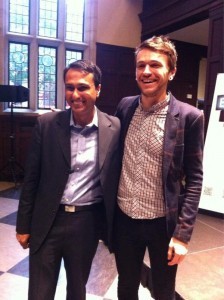 On my last day of work at Interfaith Youth Core, I had lunch with its founder, Eboo Patel. As we ate I told him that, inspired by his book “Acts of Faith,” I was going to write a book of my own about atheism and interfaith work.
On my last day of work at Interfaith Youth Core, I had lunch with its founder, Eboo Patel. As we ate I told him that, inspired by his book “Acts of Faith,” I was going to write a book of my own about atheism and interfaith work.
“Yeah?” he replied, grinning and taking a bite of his sandwich. “When?”
“Oh,” I offered, realizing I hadn’t actually thought about details. “Someday…”
“When?” he said again.
“In five years? Maybe 10?”
He thought for a second, then said, “Why not start now?”
I chewed on my sub, and on his question. Why not now? I came up with several reasons immediately: I’m young; I like to write but have little formal training; I’m really young. But I swallowed those thoughts and said: “Sure. Why not? I’ll start writing and see what happens.”
As soon as I started writing, I couldn’t stop. Before I knew it I had a book contract, and then a finished book. (My book, “Faitheist,” will be released Nov. 6 and is available for preorder.)
While I was writing, so was Eboo. I got a copy of his excellent new book, “Sacred Ground” — a vital, urgent exploration of America’s dark history of both prejudice toward religious minorities but also its principled promise of religious liberty — a few weeks ago. When I read the chapter on interfaith leadership, where he describes some of the journey I share in “Faitheist,” I was moved.
A story about an atheist in a book like “Sacred Ground” is good for atheists; it demonstrates that we have a unique contribution to make to America’s diverse religious landscape. And it will promote the idea of atheists as largely goodhearted people who want the same things most Americans do to people who might believe otherwise — people whose perceptions of atheists are based on caricature rather than meaningful relationships.
Storytelling can do that. It can connect and inspire us to new ways of thinking, to greater empathy and to increased familiarity with different experiences, identities and values.
I thought more about the power of narrative as I followed the news cycle last Sunday with a broken heart, when a white gunman stalked into a Sikh temple in Wisconsin and shot and killed six people and wounded several others. I surveyed reactions to the shooting and found they were significantly more muted than the response to the Aurora tragedy several weeks before. Perhaps people are becoming more accustomed to awful, violent outbursts such as this, but I wonder if the reactions don’t say something about the way we see “others” in this country.
Continue reading at The Huffington Post, Beacon Broadside, or IFYC.
August 11, 2012
Religion Roundup: Whispers of Intolerance
Flags at half-mast; flowers left at Gurdwara steps; candles lit against a dark, silent gathering of people from all backgrounds in solidarity with their mourning neighbors.
Days earlier. Sunday morning, August 5th. A man enters a Sikh temple mid-service and murders seven peaceful worshippers, severely injuring another two.
In the shooting’s immediate wake, a great amount of the response was utterly uplifting towards the Sikh community. Many of the loudest voices across the political and religious sphere spoke out in appreciation of their characteristic pacifism, seeking to make our nation a comfortable place for Sikhs, as they feel the weight of a peaceful space violated.
This newfound solidarity with American Sikhs comes at a critical moment, and yet, it comes far too late, and will evaporate far too quickly. In blogger Gagan Singh’s words on the day of the attack: “I request all Sikhs…who have access to media. Talk now. The world is listening. Tomorrow they won’t.”
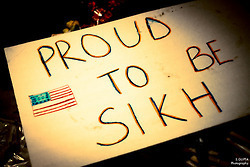 This fact that Gagan highlights compounds the existing heartbreak of a terrorist invading and slaughtering our neighbors in a peaceful place of worship and reflection. The fact that it takes a concentrated dose of tragedy to draw society’s gaze to a people who have been misattributed, maligned, and murdered on American streets for the past decade. Since September 11th, and even before, Sikhs in America have been subject to extraordinary hate and maltreatment that extends beyond just being mistaken for Muslims: xenophobia, distaste for religious difference, racism—and they have faced it with dignity, and without violent recourse.
This fact that Gagan highlights compounds the existing heartbreak of a terrorist invading and slaughtering our neighbors in a peaceful place of worship and reflection. The fact that it takes a concentrated dose of tragedy to draw society’s gaze to a people who have been misattributed, maligned, and murdered on American streets for the past decade. Since September 11th, and even before, Sikhs in America have been subject to extraordinary hate and maltreatment that extends beyond just being mistaken for Muslims: xenophobia, distaste for religious difference, racism—and they have faced it with dignity, and without violent recourse.
This is the greater tragedy: the ongoing oppression and distrust of American Sikhs, Muslims, Arabs, and anyone who otherwise might fit the profile of the “enemy”. Just this week, a mosque in Missouri was burned down in the second arson attempt against it since a July 4th attack. Several teenagers in California were recently arrested for pelting fruit at a group of Muslims during a Ramadan prayer. Every week, a new story appears, but rather than give each one ample airtime as a jigsaw in the incredible puzzle of xenophobic subjugation, the American media reduces them to a whisper. And now, mainstream outlets find they first have to identify what a Sikh even is before they can report on the crime, for they have waited for a massacre to give the community sufficient coverage.
If we are “never to forget” some of this nation’s—this world’s—tragedies, we never should forget any of them. But remembrance does not exclusively entail wristbands and tattoos and monuments. For society to forget would be for society to remain the same. We should use these dark moments as inspiration, and indications of where we can improve, in this case, diversity education and religious literacy, to support mental health and police services, to hold accountable our media for its educational shortcomings. Most importantly, though, we can use this as an opportunity to better ourselves, as we learn to find compassion in ways we may not have before.
If you’re in the Boston area, tomorrow (Sunday, August 12th), we’ll be making an interfaith trip to a local Gurdwara to educate ourselves about Sikh practices and to stand in solidarity with our neighbors. If hearing of this tragedy has inspired you to change yourself and your society, as it has me, please consider joining us:
___________________________________________________________
Memorial Service for Sikh Gurdwara Shooting
Gurdwara Guru Nanak Darbar (Medford, MA) at 11:30, August 12th
For details on carpooling visit the Humanist Community Project at Harvard website.
_________________________________________________________
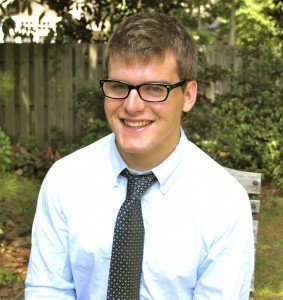 Walker Bristol is the president of the Tufts Freethought Society, and the Director of Communications for the Foundation Beyond Belief.
Originally from North Carolina, Walker was raised in a largely Quaker community before exploring several Christian traditions throughout high school and ultimately becoming a secular humanist
at age 15. Alongside fellow NPS panelist Chelsea Link, he is a contributing editor to The Unelectables, covering religious minorities and atheists in the 2012 election. And along with fellow Tufts Freethought member Lauren Rose, Walker hosts the internet radio show FreethoughtCast. In addition to being involved in secular student activism, Walker is a hobbyist musician, ballroom dancer, and aspiring jedi. He tweets nonsense @GodlessWalker.
Walker Bristol is the president of the Tufts Freethought Society, and the Director of Communications for the Foundation Beyond Belief.
Originally from North Carolina, Walker was raised in a largely Quaker community before exploring several Christian traditions throughout high school and ultimately becoming a secular humanist
at age 15. Alongside fellow NPS panelist Chelsea Link, he is a contributing editor to The Unelectables, covering religious minorities and atheists in the 2012 election. And along with fellow Tufts Freethought member Lauren Rose, Walker hosts the internet radio show FreethoughtCast. In addition to being involved in secular student activism, Walker is a hobbyist musician, ballroom dancer, and aspiring jedi. He tweets nonsense @GodlessWalker.
July 10, 2012
Values in Action: Light the Night for Cancer Research
My first tattoo rests visibly on my wrist–”C#”, commemorating the name of my godfather, Charlie Sharp, the director of an addiction treatment center in my hometown. We lost him to complications from cancer in 2010.
It’s been said so many times before, and yet still rings true, that everybody knows somebody. It’s not the existence and prevalence of cancer that, at this stage in the fight, we need to make known: people need to learn how exactly they can make a change. Where they can donate bone marrow. Where they can securely and efficiently donate funding to research. Who around them has been affected. To these ends, I believe the Leukemia and Lymphoma Society stands miles above her peer nonprofits. Transparent practices, upwards of a billion dollars invested in researching blood cancer treatment, and 76 cents on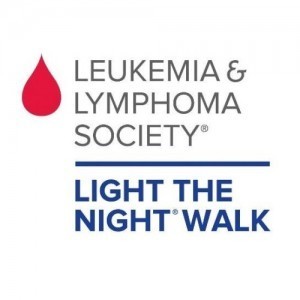 each dollar put towards research and patient services–a near perfect Charity Navigator rating.
each dollar put towards research and patient services–a near perfect Charity Navigator rating.
But, and the LLS knows this well, the fight against cancer isn’t confined to laboratories and hospitals. Again, everybody knows somebody. And sometimes the most inspiring moments, those that compose the prelude to stories of brave, compassionate heroes dedicating their lives to bettering cancer victims in their own field, come in a single evening spent alongside others who share having felt cancer’s cold touch. With candles in hand and flames in heart, we can ignite those moments together.
This is a humanist mission. The Foundation Beyond Belief has partnered with the Leukemia and Lymphoma Society to organize teams nationwide to participate in this year’s Light the Night walks. This week, we’re initiating Registration Week to encourage new members to get involved. We’ve already called to action 80 teams–the most that the LLS has ever seen. We’re hoping to reach 100, each with a dedicated group of volunteers willing to fundraise and walk with their fellow humanists, and humans, in support of the universal, science-based struggle against disease. The Stiefel family has pledged to match any donations made–doubling your efforts–until we surpass our goal of $1,000,000 raised by FBB affiliates in our inaugural year.
My “C#” is beginning to take on another meaning. And this one’s different than in the past, where upon seeing it I conjure up Charlie’s name, or the key in which his daughter-in-law and I performed some of his favorite melodies at his memorial service, or (yes) that programming language I was a fan of back in the day–this time, the “C” and the “#” don’t play into it literally. The enthusiasm I saw last weekend at the Secular Student Alliance conference when people heard about the LTN project, the extraordinary efforts we’re all engaging in to realize these goals, the utter passion taken on by organizers and members alike of nonreligious groups nationwide in this project: these will be forever intertwined with the “C#” image for me now.
Let’s put our humanist values into unprecedented action on cancer’s battlefield. Thousands of nontheistic faces, candlelit, armed with the determination that characterizes the atheist movement–eyes fixated on making an imminent difference in the lives affected by blood cancer.
This is, as they say, really something.
Just one last bit (speaking of tattoos): if the opportunity to stand alongside your friends and peers in a show of humanist goodwill and compassion isn’t incentive enough, today bloggers Pz Myers and Hemant Mehta agreed to ink themselves and Todd Stiefel agreed to sport a mohawk if 5,000 teammates sign up before Saturday evening. DO YOU NOT WANT TO PROPOGATE TATTOOS AND MOHAWKS, DEAR NONPROPHET STATUS READER?
Hell, if (when) we hit that goal I’ll get a new tattoo as well. I totally wasn’t planning it beforehand or anything.
_________________________________________________________
The LLS “Light the Night” Walks
To learn how to join a Foundation Beyond Belief-affiliated team and start fundraising: http://foundationbeyondbelief.org/LLS-lightthenight
Or (Boston-area folks!) to join the existing Harvard Humanists team to walk at Boston Common: http://pages.lightthenight.org/ma/BostonL12/HarvardHumanistBostonFBB
_________________________________________________________
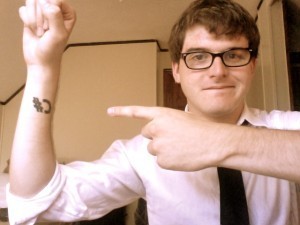 Walker Bristol is an undergraduate studying religion, politics, and linguistics at Tufts University, and is the president of the Tufts Freethought Society. Originally from North Carolina, Walker was raised in a largely Quaker community before exploring several Christian traditions throughout high school and ultimately becoming a secular humanist at age 15. Walker is currently working as the Communications and Marketing Intern for the Foundation Beyond Belief. Alongside fellow NPS panelist Chelsea Link, he is a contributing editor to The Unelectables, covering religious minorities and atheists in the 2012 election. And along with fellow Tufts Freethought member Lauren Rose, Walker hosts the internet radio show FreethoughtCast. In addition to being involved in secular student activism, Walker is a hobbyist musician, ballroom dancer, and occasional jedi. He tweets nonsense @GodlessWalker.
Walker Bristol is an undergraduate studying religion, politics, and linguistics at Tufts University, and is the president of the Tufts Freethought Society. Originally from North Carolina, Walker was raised in a largely Quaker community before exploring several Christian traditions throughout high school and ultimately becoming a secular humanist at age 15. Walker is currently working as the Communications and Marketing Intern for the Foundation Beyond Belief. Alongside fellow NPS panelist Chelsea Link, he is a contributing editor to The Unelectables, covering religious minorities and atheists in the 2012 election. And along with fellow Tufts Freethought member Lauren Rose, Walker hosts the internet radio show FreethoughtCast. In addition to being involved in secular student activism, Walker is a hobbyist musician, ballroom dancer, and occasional jedi. He tweets nonsense @GodlessWalker.
June 27, 2012
Australian Atheist Helps Redefine Interfaith Group
Today’s guest post comes from Rod Bower, a retired engineer and project manager living in Melbourne, Australia who is a former Christian and current atheist/humanist/rationalist activist (see bio below). I met Rod when I was in Australia for a few weeks in April. Rod and I got to chat, and he told me about his experiences doing interfaith work as an atheist and how he wanted to encourage others to do the same. Recently, his interfaith experiences were profiled in a great newspaper article. Check out Rod’s reflection on those experiences below!
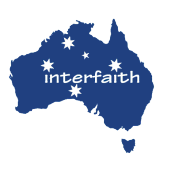
Image: CPWR
After attending the recent GAC 2012 fringe event featuring Chris Stedman, PZ Myers, and Leslie Cannold, “The Road Less Travelled: Can believers and atheists work together for the common good?”, I was asked by a few people to put down my own recent experience working with interfaith in Melbourne.
I have been concerned since I started playing in the social media, as an atheist, at how many atheists and religious people have a poor level of understanding of the others’ beliefs and point of view. Without improved dialogue and understanding I believe there will be a lot of unnecessary pain on all sides before the transformation I want to see (to a fully pluralistic, secular society) is complete. With this in mind I have been looking for ways to improve the understanding in both directions. Getting involved in interfaith came up as one of the options I should look at.
In early 2010 the (City of) Monash Interfaith Gathering (MIG) ran an “Inaugural Interfaith Forum” where the guest speaker was Professor Joseph Camilleri from the Latrobe University Centre for Dialogue. The talk included statistics on the religious demographics of Australia and worldwide, and the trends of change. However the talk on interfaith then completely ignored the 30% of our population who do not identify with a “faith community.” I subsequently approached MIG to see whether they would be interested in having an atheist join their group who could offer some insight into the missing 30% – in the interests of fulfilling their aims for a harmonious, respectful multicultural society. I attended a meeting as an “observer” first so I knew what I was getting into, and so they had a chance to assess me as a person before I put on my atheist “badge.” When I suggested joining the group, I pointed out that I had no mandate from any particular organisation and did not claim to represent all, or any, atheists other than myself. I also suggested we should both consider my involvement as an experiment and be prepared to say if it wasn’t working for us.
I was pleased when the group accepted the proposal and welcomed me on board. Over the next 18 months I was involved in committee meetings and decisions, attended events like Muslim Iftar dinners, interfaith prayer/reading breakfasts, and a state-wide gathering at the Melbourne Town Hall. Later, I was the volunteer bus driver (and a full participator) in group tours to multiple places of religious worship and learning in or near the City of Monash.
In 2011 the committee decided in my absence to dedicate part of the regular meeting time to talks given by invited members describing their faith background, their beliefs, worship places and patterns, and relationship to society. To my surprise and delight they had included in the proposed program a date for me to give a talk on this basis, as much as atheism would fit the framework. I had the advantage of watching a few other talks before mine (useful as I hadn’t done that sort of thing before). It was an exciting experience for me in several ways, and I was pleased when my slide presentation and talk was well received by the group (and by a few members of the public attracted by a newspaper invitation). The purpose of course was not to convince anyone of the “rightness” of atheism, but to have them see that, as an atheist, I was not someone to be afraid of, was not without morals, purpose or meaning in my life, and was open to respectful discussion and to learning about their values and understanding of life as well as further exploring my own. In that respect I think I was at least as successful as, for instance, a Muslim or a Hindu addressing a typical Interfaith audience.
I left MIG at the end of 2011 because I moved out of the municipality. I had made some friendships and contacts which I value and still hope to keep up with. I received many thanks for my participation, and was delighted when the chair advised another attendee (and cc’d me) that (my own) “departure is a loss to our group as he’s a clear thinker and knows how to get things done. In an interfaith group this is a real asset as he doesn’t have to worry about the politics of religion!” Perhaps even more telling was the way the group rewrote its own membership rules when forced to clarify them because of an impending formalisation of the relationship with local government. I was told by the committee that they had broadened the rules to ensure atheists (“your lot”) could be members without meeting the previous requirement to represent a “faith community”. Although some purist atheists might object to the use of “belief” where atheism is concerned, I was happy to see “various faiths” become “various faiths and beliefs” as a gesture of inclusiveness.
While I was more than satisfied with the mutual understandings that I believe came from my involvement, I don’t know whether this will change the world in any major way. The group I joined is still relatively new in interfaith terms, but is making good progress in deciding its role in the municipality and how it will operate. However at the very least I know there are now people involved with the City of Monash who can inform their own faith communities that not all atheists are either “militant religion haters” or “depressed purposeless failures,” and that in fact atheists can be interested (and hopefully interesting) people to talk to. They also know at least one person they can come to for more information, or to request support if they need to address a perceived problem with non-believers. I believe they would readily accept another atheist into the group given the chance.
I’m not sure if everyone felt the same way, but certainly there was never any difficulty at MIG. At a meeting I attended where several interfaith groups were exploring ways to work together, it did appear that MIG was the only one that had an atheist member, and one person from another group did express some concern at the idea.
From my own perspective, the interfaith experience has given me a better understanding of the beliefs and backgrounds of some of the religions in Australia that I’d had no contact with, and this has broadened my own outlook on what it means to promote and support pluralism and freedom in our society. And I have also gained contacts in those religions who I know I could go to with questions or concerns.
I would encourage any atheist who is interested in improving dialogue and understanding between atheists and believers in this way to have a go. I would also be glad to assist in getting them started.
Postscript: Since finishing at MIG I’m now also involved, among other things, in a nominally Christian men’s support group. I was invited along by a Christian friend who wanted me to give an atheist perspective on a question he was going to lead a discussion on. Again the reception has been great after initial uncertainty, and again I think this comes from my (and the other members’) willingness to share personal history, situation and world view openly, without needing to argue that others have got it wrong. This group is pretty well agreed that we are all in different places on a journey of growth and discovery, and should relate to one another as fellow travelers on the road. I’ve been told that having an openly atheist member in the group has made them discuss things in more depth rather than relying on the same old stock answers to questions.
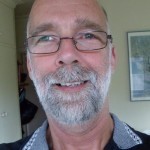 Rod Bower is a retired engineer and project manager living in Melbourne, Australia. He grew up in a typical middle class, moderately religious family. As a committed Christian throughout his teens and twenties he ran church youth groups and became an elder. After a brief experience of evangelical fundamentalism, and a family trauma, he decided to try life as an atheist to see if that resolved the “cognitive dissonance” he was experiencing. After thirty years, what was to be a six month experiment in atheism is still running successfully. He sees a need for people to respect each other as fellow travellers on their own “spiritual” journey even though their beliefs may differ radically, and he tries to promote more open and civilised discussion, particularly between believers and non-believers. Rod is a member of several atheist/humanist/rationalist groups and has recently been involved in an Interfaith group and in a nominally Christian men’s support group as the “token atheist.” He doesn’t have his own blog yet, but has started posting a few public Notes on Facebook.
Rod Bower is a retired engineer and project manager living in Melbourne, Australia. He grew up in a typical middle class, moderately religious family. As a committed Christian throughout his teens and twenties he ran church youth groups and became an elder. After a brief experience of evangelical fundamentalism, and a family trauma, he decided to try life as an atheist to see if that resolved the “cognitive dissonance” he was experiencing. After thirty years, what was to be a six month experiment in atheism is still running successfully. He sees a need for people to respect each other as fellow travellers on their own “spiritual” journey even though their beliefs may differ radically, and he tries to promote more open and civilised discussion, particularly between believers and non-believers. Rod is a member of several atheist/humanist/rationalist groups and has recently been involved in an Interfaith group and in a nominally Christian men’s support group as the “token atheist.” He doesn’t have his own blog yet, but has started posting a few public Notes on Facebook.
June 21, 2012
Happy World #Humanist Day! (Or, How a Muslim Introduced me to Humanism)

Don't let this festive picture fool you -- I still dislike the "Happy Humanist" symbol, ha.
“What’s a ‘Humanist’?”
It’s a question I hear a lot. I’m not comfortable with the idea of trying to answer it on behalf of all Humanists, so I usually respond to the question by sharing the story of how I came to identify as a Humanist. And since today is World Humanist Day, I feel inspired to share just a small bit of it here. There are many events that preceded this story but, well… I’ll get to that later.
The story of how I became a Humanist is a funny one to me in part because, after searching so long for an identity that affirmed my naturalistic worldview and compassionate ambitions, I found secular Humanism because of a Muslim.
After years of evading discussions about other people’s religious identities or challenging religious dogma in my academic studies of religion, I faltered when it came to discerning how to identify myself. I used “atheist,” “agnostic,” “nonreligious,” and “secular” interchangeably, but none of them really felt right; while each was accurate, they all seemed a bit inadequate — more like descriptors than identities. None encapsulated how I saw the world; none felt like an affirmation of the values I held. So I just went about doing interfaith work without an affiliation, content to create opportunities for people of varying worldviews to engage with one another constructively. Still, I wasn’t completely sure how to articulate my own perspective. I knew I didn’t believe in God, but found the idea of declaring positive values much more daunting.
But through the process of doing interfaith work — through building relationships of understanding and cooperation with religious people — that began to change. Inspired by others’ commitments to their varying worldviews, I began to more deeply consider my own. While interning at Interfaith Youth Core (IFYC), my friend Eboo Patel introduced me to Greg Epstein’s Good Without God and the works of other contemporary Humanists. From there, I began to devour Humanist literature; Confucius, Epicurus, and Renaissance Humanism, up to more recent Humanist thinkers like Robert G. Ingersoll and Paul Kurtz. I read the various editions of the Humanist Manifestos and jumped up excitedly to repeat their words aloud: “Humanism is a progressive philosophy of life that, without supernaturalism, affirms our ability and responsibility to lead ethical lives of personal fulfillment that aspire to the greater good of humanity.“ This was what I believed — particularly its emphasis on taking personal responsibility for the greater good of all — but another person had written it down.
Inspired by what I’d read, I decided to act. Along with a group of other atheist friends, my friend Erik and I started up a group we called the Secular Humanist Alliance of Chicago (SHAC), to construct an egalitarian community of like-minded individuals. We planned service projects, hosted dialogue events with members of Chicago’s Muslim community, and wrote blog posts. But more than anything else, we were a community.
Encouraged by the books I read and the subsequent conversations I had with these friends, I started see my Humanism as not just something I thought about, but something I needed to act upon. The positive orientation of my Humanism allowed me to frame the world through a constructive, optimistic lens, and it became an expression of my greatest ambitions — one that sought out and celebrated the good in everyone, and encouraged me to act with love and compassion whenever possible, seeking to understand instead of dismiss.
For the first time in as long as I could remember, I felt invested in a positive and deeply personal identity that pretty accurately mapped onto my own convictions. And, as is the case whenever I’m excited about something, I couldn’t shut up about it.
So I started blogging here at NonProphet Status, then elsewhere, and then I started writing a book about the aforementioned “many events” — about how I went from nonreligious to Evangelical Christian to openly gay atheist to Humanist and interfaith activist. That’s coming out in November. I am also proud to work for a Humanist organization, the Humanist Community at Harvard, which works to provide resources for the nonreligious. After a year and a half as the organization’s inaugural Interfaith and Community Service Fellow, I am transitioning into the role of Assistant Humanist Chaplain. Perhaps my favorite part of this job is getting to listen to Humanists talk about their stories, their values, and about how they understand Humanism — and then moving, as a community, from talking about our values to putting them into action.
I keep talking and writing and listening and acting and asking about my and other people’s Humanism because the idea of a nonreligious identity based in positive values gives me hope for our future — a future in which everyone, nonreligious and religious alike, cares much more about the “good” than the “without (or with) God.” Such a vision may sound overly optimistic to some, but if a devout Muslim can introduce an atheist like me to Humanism, then I believe anything is possible.
If you’re a Humanist, please feel free to share the story of how you became one in the comments. If you’re not, feel free to ask questions, or share a story about a Humanist that inspires you!
Want to get involved in Humanism? Check out the Humanist Community Project website for more!
June 18, 2012
The Dramatic Conversion of Leah Libresco
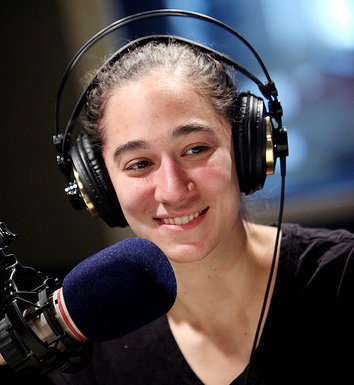 This morning, atheist blogger and 2011 Yale graduate Leah Libresco announced on her blogging network, Patheos, that she will no longer post in the atheist section of the site. She will still be blogging, but instead as a Catholic. Several months ago, she converted to Catholicism.
This morning, atheist blogger and 2011 Yale graduate Leah Libresco announced on her blogging network, Patheos, that she will no longer post in the atheist section of the site. She will still be blogging, but instead as a Catholic. Several months ago, she converted to Catholicism.
Drastically reversing any position—particularly a public one—is a seriously daunting thing to do. Though Leah and I don’t see eye-to-eye on many philosophical issues, especially this one, I admire her integrity. The reason for her conversion—realizing that she believes that the Moral Law is real and a Person—is hard for me to understand. Most charitably, it seems that her justification is opaque and too complicated for one blog post. At worst, it may be philosophically confused. But I’ve read enough of Leah’s writing to know she’s a smart and thoughtful person who must have good reasons for what she believes, particularly since she’s been sitting on this since April.
I’ve noticed that among atheists, the general reaction seems to be either “dafuq?” or “yeah, I guess that makes sense,” with little in between except for suggestions that she’s had a stroke or was never a “real” atheist at all (Leah has very cleverly replied to the stroke accusation here). Since Leah describes herself in her post as “a virtue ethicist atheist whose transhumanism seems to be rooted in dualism,” it’s pretty clear to me which commenters have actually read her work (or understand any of those words).
I’m in a kind of weird spot where I’m sympathetic to a lot of her positions, but I don’t understand her rationale at all. I go back and forth between brands of consequentialism and Neo-Kantianism as my ethical theory of choice, and I’m almost certain that if the former is true, abortion is terrible and we are all awful people for spending money on vacations and pets and videogames instead of donating the vast majority of our earnings to assist the global poor. All of this goes to say that I seriously empathize with someone struggling for philosophical consistency, and I understand that it can lead you to some bizarre and unintuitive conclusions. And when faced with those conclusions, it’s frankly an unsatisfying cop-out to avoid them by simply rejecting the premises you started with. It seems that she has opted instead to bite the bullet—Catholicism must be the most consistent with her moral conclusions (and many commenters and bloggers have missed the point that this is more in reference to Aquinas than abortion).
I’m sorry to say that I can’t provide much personal insight—we belonged to very different circles while at Yale, and even our interests in Christianity split: she spent her time studying Catholicism with friends, and I explored evangelism with the Yale Students for Christ—so until she writes more on her conversion, I can’t begin to understand the finer points of her philosophical conclusions.
But I’ve generally found the reaction to be both predictable and disappointing, and I think it shows a serious lack of empathy and intellectual curiosity in many atheists. The most common reaction I’ve seen is just blatant incredulity, which I think not only reflects an inability to understand why anyone would convert to Catholicism, but why anyone would be a Catholic to begin with. I see the “there is no evidence for religion, all believers are brainwashed” narrative almost accepted as the default atheist position (pandered by American Atheist President Dave Silverman at just about every opportunity), but it seems so clearly absurd to me.
There are basically two options for atheists here. First: everyone is just evidence-insensitive except for us, in which case atheists are the uniquely rational group that, either upon our births or conversion, had a “rational” switch flipped on in our heads. If the evidence leads only to atheism, how could anyone else looking at the evidence believe anything else? Well, they must not be looking at the evidence, then.
I prefer the second option: that people generally believe things for good reasons (qualify “people” with “thoughtful” if you must). If it doesn’t seem like it to us, either we don’t know enough about where they’re starting from (we don’t all have the same philosophical commitments), or we don’t know enough about what evidence they’re applying (evidence, of course, is usually interpreted much more broadly than many atheists would like to admit). It’d be a failure of empathy and critical thinking to assume they’re simply brainwashed or indoctrinated.
I think it’s an inconvenient position, but some people have good reasons for believing in God. Whether or not their reasons are available to us is a different matter—I’m still not sure how Leah’s philosophical commitments lead her to Catholicism—but I don’t doubt that she’s rational enough to see the world and decide that those commitments are probably true, and that Catholicism most logically follows. If she’s made a mistake somewhere, we can certainly try to find it.
Otherwise, any argument or debate is started by assuming the other person is brainwashed or irrational, and how can that turn into anything other than a “look how smart I am!” parade? It’s not so much a conversation as a sparring match with an imaginary partner. Other than reciting your talking points while the other is left with little more than the feeling that you’ve addressed a caricature, what’s the point?
I think we atheists ought to consider seriously and carefully why others believe what they do, in a way that isn’t either self-congratulatory or pointless. It’s too easy and unproductive to simply wave our collective hands while vaguely appealing to psychology in order to explain why people are religious. So instead of disappointment or incredulity, I’m looking forward to Leah’s future posts with curiosity—how better to understand Catholicism than by reading about a peer’s conversion?
 Vlad Chituc is a recent graduate of Yale University, where he studied Psychology with an interest in metaphysics and moral philosophy on the side. He has served as the Community Service Coordinator and President of the Secular Student Alliance at Yale (formerly the Yale Humanist Society), during which he participated in the Inter-Religious Leaders Council and worked closely with the Yale Chaplain’s Office to foster relationships with liberal members of the Yale religious community. In his spare time, Vlad enjoys listening to hipster bullshit and writing for several campus publications. Next year, he will be a lab manager and research assistant at one of Duke’s social neuroscience labs.
Vlad Chituc is a recent graduate of Yale University, where he studied Psychology with an interest in metaphysics and moral philosophy on the side. He has served as the Community Service Coordinator and President of the Secular Student Alliance at Yale (formerly the Yale Humanist Society), during which he participated in the Inter-Religious Leaders Council and worked closely with the Yale Chaplain’s Office to foster relationships with liberal members of the Yale religious community. In his spare time, Vlad enjoys listening to hipster bullshit and writing for several campus publications. Next year, he will be a lab manager and research assistant at one of Duke’s social neuroscience labs.
June 12, 2012
Religion Roundup: Liberating Europe
Given my absence (a combination of personal hurtles, final exams, and studies abroad), I just wanted to, quite literally, do a “roundup” of recent religion-infused news worldwide for this piece.
Firstly, in another in a series of global victories (although certainly alongside losses, as in North Carolina last month) for the queer rights movement, the coalition government in the United Kingdom has spoken in favor of granting equal marriage rights to homosexual and heterosexual couples after years of only allowing the former to obtain civil partnerships. Heresy! Outrage! The Church of England retorts: “[Our] unique place in the current marriage law of England means that the proposals will have a very significant impact on our ability to serve the people of the nation as we have always done.” Read: introducing equality would threaten their privileged (and indeed unpopular among British citizenry) position in the UK government. Their fear, unfortunately, seems unfounded. British Humanist Association leader Andrew Copson wrote a brilliant and succinct response to the notion that the new law would rift the church and state, although I think there’s another element of the debate he doesn’t quite mention: the role of the monarchy. Indeed, even if most of her power is encapsulated in symbolism, if the recent overcoverage has Diamond Jubilee has shed light upon anything of substance, it’s how much people in Britian, and even moreso it seems elsewhere (cough, America), are infatuated with the Queen. Still the supreme leader of the CoE, and still the recipient of undying reverence from much of Parliament, Elizabeth II, despite however much Kennedyesque irresponsibility plagues the Family, remains a figurehead of both religious and cultural-political life in the UK. And again, as Andrew makes good note of, it would be an entirely popular move to segregate the CoE from the English government—yet if this is going to happen, the first step would be to separate the Queen from this oddly prevalent appreciation of the fairy-tale conception of the monarchy, not to modernize the institution of marriage.
Looking southward in Europe, France—where I’m June-ing (does that work? I think it works), in an Alpine village near Lyon—is in the midst of a parliamentary election process in the wake of its presidential shift from the conservative Nicolas Sarkozy to the socialist François Hollande. The primary question asked of this week’s election is whether or note President-elect Hollande will garner the parliamentary sway to move forward with Socialist fiscal policies—essentially, will the left earn a majority vote in the legislature. French Catholics are already outraged with Hollande’s intentions with regard to social policy—as he seeks to follow David Cameron on same-sex marriage policy as well as “cut government funding to religious schools”. All together now: Heresy! Outrage! Cue “Justify My Love”.
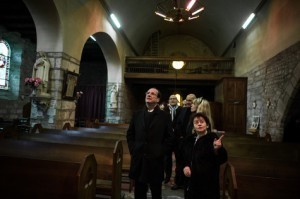
Hollande, resembling an older Jon Favreau, tours a church.
Thousands of Catholics took to the Parisian streets in protest (incidentally, Hollande hasn’t even been inaugurated yet, let alone won enough traction in parliament to implement any of these promises). France is pretty demographically interesting, though: while around 51% of French identify as Catholic, only about 5% admit to regularly attending Mass. Non-practicing doesn’t necessitate a liberal view on social issues, but it certainly implies that the Catholic population is incredibly politically diverse in France (indeed, Hollande was elected by popular vote), so the protest of some doesn’t mean the support of the many. Even in institutionalized traditions, opinions are not uniform—so liberal social policy change is still, indeed a likely, possibility for France.
One more story, this one still within Catholicism but down in the hub-”nation” of the Vatican: a group of nuns from US shores are to be brought before the head of the Doctrine Office to answer for the crime of…feminism! They, evidently, sought a more progressive view on social issues. Speaking with fantastic reason, and with exactly the same criticism I would lift, the nuns of the Leadership Conference of Women Religious have countered the claim that their efforts are too “radical” by noting how damn important it is for the US Church to regain footing amid the still not-infrequent sexual abuse cases among the “celibate” clergy. Calling into question the progressive actions of a few nuns has “caused scandal and pain…and greater polarization” within the community, they hold, and although the Vatican is allegedly hoping for a “constructive conversation” on the issue, the femi-nuns seem steadfast in their efforts to progressivize Church and steer it in a direction of acting as a force for good in the world, which indeed involves acting in the face of much of Holy See policy. Once again—it may be institutionalized, it may have a Head (with a big hat) and an administration and a doctrine, but even Catholicism accounts for a wide range of opinions and values. Change, away from some of the most narrow-minded and wicked policies of the last few decades, may be in the Church’s nearsights.
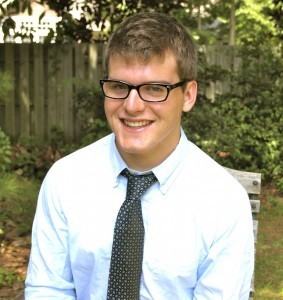 Walker Bristol is an undergraduate studying religion and linguistics at Tufts University, and is the president of the Tufts Freethought Society. Originally from North Carolina, Walker was raised in a largely Quaker community before exploring several Christian traditions throughout high school and ultimately becoming a secular humanist at age 15. Walker is currently studying abroad in Talloires, France, and working as the Communications and Marketing Intern for the Foundation Beyond Belief. He is a contributing editor to The Unelectables, covering religious minorities and atheists in the 2012 election. Along with fellow Tufts Freethought board member Lauren Rose, Walker hosts the internet radio show FreethoughtCast. In addition to being involved in secular student activism, Walker is a hobbyist musician, ballroom dancer, and self-proclaimed sci-fi geek. He tweets nonsense @GodlessWalker.
Walker Bristol is an undergraduate studying religion and linguistics at Tufts University, and is the president of the Tufts Freethought Society. Originally from North Carolina, Walker was raised in a largely Quaker community before exploring several Christian traditions throughout high school and ultimately becoming a secular humanist at age 15. Walker is currently studying abroad in Talloires, France, and working as the Communications and Marketing Intern for the Foundation Beyond Belief. He is a contributing editor to The Unelectables, covering religious minorities and atheists in the 2012 election. Along with fellow Tufts Freethought board member Lauren Rose, Walker hosts the internet radio show FreethoughtCast. In addition to being involved in secular student activism, Walker is a hobbyist musician, ballroom dancer, and self-proclaimed sci-fi geek. He tweets nonsense @GodlessWalker.
June 4, 2012
June & July 2012 Speaking Gigs: Louisiana, North Carolina, Nevada, Pennsylvania
 Hey folks! After a very full speaking schedule in April (Minnesota, Australia, and Illinois), I spent the entire month of May in Massachusetts. It was a busy month at work (that included two new hires at HCH — check out an interview Greg and I did for the Friendly Atheist to learn more), but it was good to get a break from travel. I kind of needed it. But as nice as it was, I do love to get out there to meet people from all over.
Hey folks! After a very full speaking schedule in April (Minnesota, Australia, and Illinois), I spent the entire month of May in Massachusetts. It was a busy month at work (that included two new hires at HCH — check out an interview Greg and I did for the Friendly Atheist to learn more), but it was good to get a break from travel. I kind of needed it. But as nice as it was, I do love to get out there to meet people from all over.
For the second year in a row, I’m planning a community service project to close the American Humanist Association’s annual conference. (This year, I’ll also be speaking.) A few weeks later, I’ll be speaking at a progressive Christian conference in North Carolina alongside folks like Jim Wallis, Derek Webb, and many others. (And I’ll get to sleep in a tent!) In July, I’ll be at The Amaz!ng Meeting (the world’s largest conference on skepticism and science) for the first time (I almost went last summer but couldn’t make it due to a work conflict). Finally, I’ll be speaking at the Interfaith Youth Core’s Interfaith Leadership Institute, which is always one of my favorite events to participate in. (College students, staff, and faculty: it’s not too late to apply!)
Here is my speaking schedule for the next couple of months — the first being this week:
6/7-10
American Humanist Association Conference
New Orleans, LA
Speaking, tabling, and leading a community service project (with Brad Pitt’s Make It Right Foundation)
6/21-24
Wild Goose Festival
Shakori Hills, NC
Speaking
7/12-15
The Amaz!ng Meeting
Las Vegas, NV
Speaking, workshop, and tabling
7/16-19
Interfaith Youth Core (IFYC) Interfaith Leadership Institute
Philadelpha, PA
Speaking
I hope to see you at one of these events!
May 16, 2012
[Updated] Australia Recap: “Soppy Interfaith” Edition (Loaded With Audio, Video, & More!)
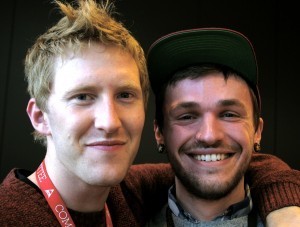
With Jason Ball, Spokesperson for the Atheist Foundation of Australia and presenter at the Global Atheist Convention.
Hey there! Sorry for being a bit absent lately, but things have been very busy — the academic year is wrapping up at Harvard and we’re gearing up for a big summer, planning and preparing for a year unlike any we’ve seen before. In addition to all that, I just submitted my final line edits for Faitheist to Beacon Press! So this post got slightly delayed in the hubbub of a busy month.
Last month I visited Australia for nearly 2 weeks of speaking engagements, timed to coincide with the Global Atheist Convention (the largest atheist conference ever)… and man, was I busy! I went from Sydney to Canberra to Melbourne and was scheduled with obligations for most of the trip — in fact, I was so booked that I didn’t even get to see a koala, kangaroo, platypus, or Natalie Imbruglia! (I made this joke a couple of times during my visit, but Australians didn’t seem to find it so funny. What they didn’t realize is that I was only half-joking about wanting to see Natalie Imbruglia. I mean c’mon, I grew up in the 90s! This is how I feel…)
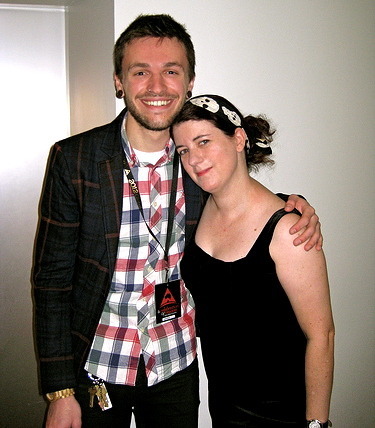
With Kylie Sturgess, "Token Skeptic" and co-emcee of the Global Atheist Convention.
Okay, all jokes aside, I had an amazing time in Oz. It was an incredible opportunity to travel around the world’s largest island / smallest continent, meet and learn from so many different people, and discuss how the intersection of interfaith and atheism plays out down under. I still have many thoughts about the trip, which I may try to distill further at some point down the road, but here’s a roundup of what went down (along with some media).
Before I go on, I need to give a huge shoutout and express my heartfelt gratitude to all of the wonderful folks the Rationalist Society of Australia, InterAction, Humanist Society of Victoria, Global Atheist Convention, Atheist Foundation of Australia, Freethought Student Alliance, and Embiggen Books, all of whom made it possible for me to have this once-in-a-lifetime experience.
The Road Less Traveled Panel with PZ Myers & Leslie Cannold
(Global Atheist Convention Official Finge event)
This panel discussion on whether atheists and the religious can work together for the common good – a conversation between me, hugely popular atheist blogger PZ Myers, and Australian public  intellectual Leslie Cannold – was perhaps the most anticipated part of my Australian itinerary. It was talked up in the blogosphere as a ‘showdown’ between me and PZ (here’s PZ himself framing it as such).
intellectual Leslie Cannold – was perhaps the most anticipated part of my Australian itinerary. It was talked up in the blogosphere as a ‘showdown’ between me and PZ (here’s PZ himself framing it as such).
Despite that hype, I think it ended up being a pretty insightful chat. But I know a lot of people want to listen to hear what went down when the moderator (Meredith Doig) asked PZ and I about how PZ has called me things like a “soppy interfaith wanker” (among other, erm, pleasantries) on his blog, how I responded when he said I “sucked,” or what happened when I challenged PZ directly about whether his characterizations of interfaith are based in any kind of actual experience or observation. So whether you want to listen for the thoughtful discussion, or for the moments that got the audience all riled up… You can stream or download the audio below on soundcloud, or here on the Rationalist Society of Australia’s website. Rumor has it that video from this event will eventually see the light of day, too.
Anyway, I strongly encourage you to listen to the audio above! All in all, I really enjoyed this event — I confess I had been a bit nervous as I’m still pretty new at all of this and it was my first public discussion with someone who has been extremely critical of my work (and critical of me as a person, too), but I had fun with it and I really appreciated the opportunity to have a, y’know… dialogue.
Update: Video from the event has gone online. It is embedded below, in case you skeptics wanted proof that we were actually all under the same roof. Also, now you can see that I wore my best tie and that I gesture with my hands a lot when speaking.
Wheeler Centre speech (Global Atheist Convention Official Fringe event)
I loved speaking at the Wheeler Centre for Books, Writing, and Ideas as a part of their awesome Lunchbox/Sopabox speaker series. For this event, which was also a part of the Global Atheist Convention’s official Fringe lineup, I was asked to talk for exactly 20 minutes (as opposed to my usual 45 or so). This challenged me to really get my ideas across in a condensed, concise way. (I find that very difficult! haha) I really enjoyed myself — there were some great questions during the Q&A and meaningful discussion after. In addition to streaming the video above, you can also download the audio here (to save the file, hit control and click, then select save) or the video here (do the same).
Other speeches
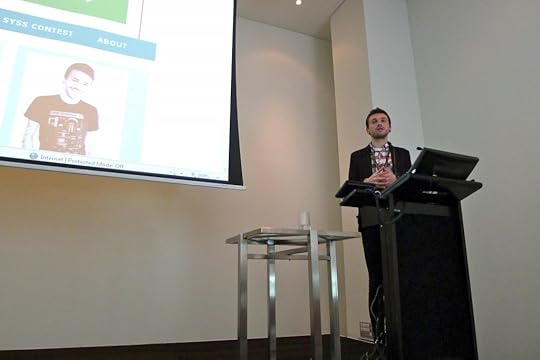
Speaking at the first Australian Freethought Student Alliance conference.
I did a few other speaking engagements while down under. I spoke at the first conference for the Freethought Student Alliance who (much like the Secular Student Alliance or the Center for Inquiry On Campus) coordinates, connects, and empowers atheist, agnostic, skeptic, humanist, and nonreligious Australian students. I talked about the ins and outs of interfaith work and facilitated break-out sessions to discuss how to reach out to religious campus groups. All in all, it was an amazing one day conference that brought together students from campus groups all over Australia — in addition to mine, it also featured keynotes Lyz Liddell of the Secular Student Alliance and Debbie Goddard of the Center for Inquiry On Campus — and I was honored to be a part of it. I also did a speaking event in Canberra co-hosted by the fabulous folks from the ANU League of Godlessness, Canberra Atheist Church, & Canberra Atheist Meetup Group (they also very kindly surprised me with a birthday dinner and cake to celebrate turning 25!) and facilitated a discussion for a fantastic organization called InterAction (Australia’s interfaith youth social action organization) called “Some of my best friends are atheists.” (More on those events below.)
Radio interview on Sunday Night Safran
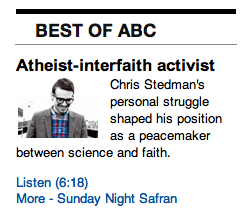 Sunday Night Safran is a popular program that airs on Triple J, a national, government-funded Australian radio station intended to appeal to folks between the ages of 18 and 30. I was interviewed on the show the weekend of the Global Atheist Convention, appearing after Wikileaks founder Julian Assange’s mother. You can click here to download the full episode through iTunes. Also,the Australian Broadcasting Corporation selected my interview from this show to be highlighted in their “Best Of” series — if you click here, you can go to that site and listen to or download an excerpt of my interview.
Sunday Night Safran is a popular program that airs on Triple J, a national, government-funded Australian radio station intended to appeal to folks between the ages of 18 and 30. I was interviewed on the show the weekend of the Global Atheist Convention, appearing after Wikileaks founder Julian Assange’s mother. You can click here to download the full episode through iTunes. Also,the Australian Broadcasting Corporation selected my interview from this show to be highlighted in their “Best Of” series — if you click here, you can go to that site and listen to or download an excerpt of my interview.
Crosslight and Canberra Times features
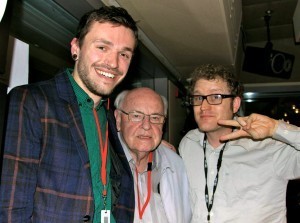
With the hosts of Sunday Night Safran.
Crosslight wrote two stories referencing my visit. The first was a thorough, very interesting article on the Global Atheist Convention featuring interviews with Richard Dawkins, Sam Harris, Ayaan Hirsi Ali, and — of all people – me. I really appreciate that they decided to include my perspective alongside the perspectives of such prominent atheists. Portions of my interview appear at both the beginning and at the end of the piece — click here to check it out. Additionally, they wrote a story on my event with InterAction, which can be found here. And while I was in Canberra, the Australian capital city’s largest newspaper interviewed me for a feature story called “Losing My Religion,” in which I talk about how I got into this work. You can click here if you’d like to read it.
Other radio interviews: JOY 94.9, 4ZZZ FM, Manthropolgy, & Token Skeptic
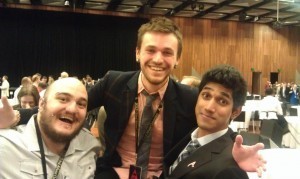
Goofing off with some students at the Global Atheist Convention gala dinner.
I did a few other radio interviews while in Oz. I appeared on JOY 94.9′s The Spirit Room — a radio show focused on LGBTQ identity and religion — for their entire hour. JOY 94.9 is pretty special as it is a 24-hour LGBTQ radio station featuring all original content (one of only a handful in the world). I had such a great time; especially because the hosts invited me to pick out a few songs that I find meaningful to play on the air. (Spoiler: I chose songs by Brother Ali, Okkervil River, and John Grant — listen to the program if you want to hear my reasoning for choosing them!) You can click here to stream the episode (or control, click, and select save to download it).
I also did an interview with Jayson Daniel Cooke of Brisbane’s 4ZZZ FM — click here for their story on it and to stream or download the interview, or click here to download the MP3 directly. During my visit I also got to sit down with Australian comedian Simon Taylor for over an hour for a lengthy episode of his show Manthropology — we talked about my work and how I got into it (I shared a bunch of stories), but also about what it means to be a young man in the world today. Click here to download it through iTunes, or go here to download from the web. Finally, I did a 30 minute interview with the Token Skeptic podcast, hosted by Kylie Sturgess, right before I left for Australia where I talked about Faitheist, “confrontationalism versus accommodationism,” interfaith work and atheism, The Humanist Chaplaincy at Harvard, and more. You can click here to get it through iTunes, or here to get it from the Token Skeptic site. I had such a fantastic time talking with all of these folks!
Some very quick thoughts on the Global Atheist Convention
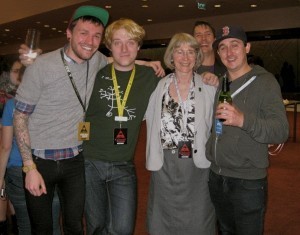
At a convention reception with Eugenie Scott, Jack Scanlan, and other new friends!
The Global Atheist Convention was, for the most part, a fabulous experience. I was particularly inspired by Jason Ball, a young guy who is doing a lot around atheism and interfaith dialogue in Australia. Other speakers that really impressed me included Leslie Cannold (besides appearing on the panel alongside me and PZ, she spoke eloquently at the convention about the separation of church and state and the many problems Australia faces regarding church-state protection), Marion Maddox (a brilliant academic on religion and politics), Sam Harris (who spoke powerfully about death and mindfulness and led the conference in a guided mindfulness meditation – easily the biggest curveball of the weekend), Eugenie Scott (who is just always so wise), Daniel Dennett (who I find to be as bizarrely funny as he is thought-provoking), and many others. There were a few things that put a bad taste in my mouth (which I addressed in my blog post to Sam Harris a couple of weeks ago), but all in all it was such a treat to be a part of this historic event.
That’s it from me for now — I may write some more on the trip if I get the chance, but for now it’s back to work. As always, I’d love to hear your thoughts on any of this in the comments. Thanks for reading, friends!

Some of the folks at InterAction's "Some of my best friends are atheists" discussion.
Australia Recap: “Soppy Interfaith” Edition (Loaded With Audio, Video, & More!)

With Jason Ball, Spokesperson for the Atheist Foundation of Australia and presenter at the Global Atheist Convention.
Hey there! Sorry for being a bit absent lately, but things have been very busy — the academic year is wrapping up at Harvard and we’re gearing up for a big summer, planning and preparing for a year unlike any we’ve seen before. In addition to all that, I just submitted my final line edits for Faitheist to Beacon Press! So this post got slightly delayed in the hubbub of a busy month.
Last month I visited Australia for nearly 2 weeks of speaking engagements, timed to coincide with the Global Atheist Convention (the largest atheist conference ever)… and man, was I busy! I went from Sydney to Canberra to Melbourne and was scheduled with obligations for most of the trip — in fact, I was so booked that I didn’t even get to see a koala, kangaroo, platypus, or Natalie Imbruglia! (I made this joke a couple of times during my visit, but Australians didn’t seem to find it so funny. What they didn’t realize is that I was only half-joking about wanting to see Natalie Imbruglia. I mean c’mon, I grew up in the 90s! This is how I feel…)

With Kylie Sturgess, "Token Skeptic" and co-emcee of the Global Atheist Convention.
Okay, all jokes aside, I had an amazing time in Oz. It was an incredible opportunity to travel around the world’s largest island / smallest continent, meet and learn from so many different people, and discuss how the intersection of interfaith and atheism plays out down under. I still have many thoughts about the trip, which I may try to distill further at some point down the road, but here’s a roundup of what went down (along with some media).
Before I go on, I need to give a huge shoutout and express my heartfelt gratitude to all of the wonderful folks the Rationalist Society of Australia, InterAction, Humanist Society of Victoria, Global Atheist Convention, Atheist Foundation of Australia, Freethought Student Alliance, and Embiggen Books, all of whom made it possible for me to have this once-in-a-lifetime experience.
The Road Less Traveled Panel with PZ Myers & Leslie Cannold
(Global Atheist Convention Official Finge event)
This panel discussion on whether atheists and the religious can work together for the common good – a conversation between me, hugely popular atheist blogger PZ Myers, and Australian public  intellectual Leslie Cannold – was perhaps the most anticipated part of my Australian itinerary. It was talked up in the blogosphere as a ‘showdown’ between me and PZ (here’s PZ himself framing it as such).
intellectual Leslie Cannold – was perhaps the most anticipated part of my Australian itinerary. It was talked up in the blogosphere as a ‘showdown’ between me and PZ (here’s PZ himself framing it as such).
Despite that hype, I think it ended up being a pretty insightful chat. But I know a lot of people want to listen to hear what went down when the moderator (Meredith Doig) asked PZ and I about how PZ has called me things like a “soppy interfaith wanker” (among other, erm, pleasantries) on hig blog, how I responded when he said I “sucked,” or what happened when I challenged PZ directly about whether his characterizations of interfaith are based in any kind of actual experience or observation. So whether you want to listen for the thoughtful discussion, or for the moments that got the audience all riled up… You can stream or download the audio below on soundcloud, or here on the Rationalist Society of Australia’s website. Rumor has it that video from this event will eventually see the light of day, too.
Anyway, I strongly encourage you to listen to the audio above! All in all, I really enjoyed this event — I confess I had been a bit nervous as I’m still pretty new at all of this and it was my first public discussion with someone who has been extremely critical of my work (and critical of me as a person, too), but I had fun with it and I really appreciated the opportunity to have a, y’know… dialogue.
Wheeler Centre speech (Global Atheist Convention Official Fringe event)
I loved speaking at the Wheeler Centre for Books, Writing, and Ideas as a part of their awesome Lunchbox/Sopabox speaker series. For this event, which was also a part of the Global Atheist Convention’s official Fringe lineup, I was asked to talk for exactly 20 minutes (as opposed to my usual 45 or so). This challenged me to really get my ideas across in a condensed, concise way. (I find that very difficult! haha) I really enjoyed myself — there were some great questions during the Q&A and meaningful discussion after. In addition to streaming the video above, you can also download the audio here (to save the file, hit control and click, then select save) or the video here (do the same).
Other speeches

Speaking at the first Australian Freethought Student Alliance conference.
I did a few other speaking engagements while down under. I spoke at the first conference for the Freethought Student Alliance who (much like the Secular Student Alliance or the Center for Inquiry On Campus) coordinates, connects, and empowers atheist, agnostic, skeptic, humanist, and nonreligious Australian students. I talked about the ins and outs of interfaith work and facilitated break-out sessions to discuss how to reach out to religious campus groups. All in all, it was an amazing one day conference that brought together students from campus groups all over Australia — in addition to mine, it also featured keynotes Lyz Liddell of the Secular Student Alliance and Debbie Goddard of the Center for Inquiry On Campus — and I was honored to be a part of it. I also did a speaking event in Canberra co-hosted by the fabulous folks from the ANU League of Godlessness, Canberra Atheist Church, & Canberra Atheist Meetup Group (they also very kindly surprised me with a birthday dinner and cake to celebrate turning 25!) and facilitated a discussion for a fantastic organization called InterAction (Australia’s interfaith youth social action organization) called “Some of my best friends are atheists.” (More on those events below.)
Radio interview on Sunday Night Safran
 Sunday Night Safran is a popular program that airs on Triple J, a national, government-funded Australian radio station intended to appeal to folks between the ages of 18 and 30. I was interviewed on the show the weekend of the Global Atheist Convention, appearing after Wikileaks founder Julian Assange’s mother. You can click here to download the full episode through iTunes. Also,the Australian Broadcasting Corporation selected my interview from this show to be highlighted in their “Best Of” series — if you click here, you can go to that site and listen to or download an excerpt of my interview.
Sunday Night Safran is a popular program that airs on Triple J, a national, government-funded Australian radio station intended to appeal to folks between the ages of 18 and 30. I was interviewed on the show the weekend of the Global Atheist Convention, appearing after Wikileaks founder Julian Assange’s mother. You can click here to download the full episode through iTunes. Also,the Australian Broadcasting Corporation selected my interview from this show to be highlighted in their “Best Of” series — if you click here, you can go to that site and listen to or download an excerpt of my interview.
Crosslight and Canberra Times features

With the hosts of Sunday Night Safran.
Crosslight wrote two stories referencing my visit. The first was a thorough, very interesting article on the Global Atheist Convention featuring interviews with Richard Dawkins, Sam Harris, Ayan Hirsi Ali, and — of all people – me. I really appreciate that they decided to include my perspective alongside the perspectives of such prominent atheists. Portions of my interview appear at both the beginning and at the end of the piece — click here to check it out. Additionally, they wrote a story on my event with InterAction, which can be found here. And while I was in Canberra, the Australian capital city’s largest newspaper interviewed me for a feature story called “Losing My Religion,” in which I talk about how I got into this work. You can click here if you’d like to read it.
Other radio interviews: JOY 94.9, 4ZZZ FM, Manthropolgy, & Token Skeptic

Goofing off with some students at the Global Atheist Convention gala dinner.
I did a few other radio interviews while in Oz. I appeared on JOY 94.9′s The Spirit Room — a radio show focused on LGBTQ identity and religion — for their entire hour. JOY 94.9 is pretty special as it is a 24-hour LGBTQ radio station featuring all original content (one of only a handful in the world). I had such a great time; especially because the hosts invited me to pick out a few songs that I find meaningful to play on the air. (Spoiler: I chose songs by Brother Ali, Okkervil River, and John Grant — listen to the program if you want to hear my reasoning for choosing them!) You can click here to stream the episode (or control, click, and select save to download it).
I also did an interview with Jayson Daniel Cooke of Brisbane’s 4ZZZ FM — click here for their story on it and to stream or download the interview, or click here to download the MP3 directly. During my visit I also got to sit down with Australian comedian Simon Taylor for over an hour for a lengthy episode of his show Manthropology — we talked about my work and how I got into it (I shared a bunch of stories), but also about what it means to be a young man in the world today. Click here to download it through iTunes, or go here to download from the web. Finally, I did a 30 minute interview with the Token Skeptic podcast, hosted by Kylie Sturgess, right before I left for Australia where I talked about Faitheist, “confrontationalism versus accommodationism,” interfaith work and atheism, The Humanist Chaplaincy at Harvard, and more. You can click here to get it through iTunes, or here to get it from the Token Skeptic site. I had such a fantastic time talking with all of these folks!
Some very quick thoughts on the Global Atheist Convention

At a convention reception with Eugenie Scott, Jack Scanlan, and other new friends!
The Global Atheist Convention was, for the most part, a fabulous experience. I was particularly inspired by Jason Ball, a young guy who is doing a lot around atheism and interfaith dialogue in Australia. Other speakers that really impressed me included Leslie Cannold (besides appearing on the panel alongside me and PZ, she spoke eloquently at the convention about the separation of church and state and the many problems Australia faces regarding church-state protection), Marion Maddox (a brilliant academic on religion and politics), Sam Harris (who spoke powerfully about death and mindfulness and led the conference in a guided mindfulness meditation – easily the biggest curveball of the weekend), Eugenie Scott (who is just always so wise), Daniel Dennett (who I find to be as bizarrely funny as he is thought-provoking), and many others. There were a few things that put a bad taste in my mouth (which I addressed in my blog post to Sam Harris a couple of weeks ago), but all in all it was such a treat to be a part of this historic event.
That’s it from me for now — I may write some more on the trip if I get the chance, but for now it’s back to work. As always, I’d love to hear your thoughts on any of this in the comments. Thanks for reading, friends!

Some of the folks at InterAction's "Some of my best friends are atheists" discussion.



